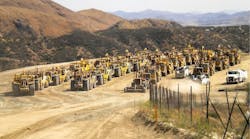A Maine logging company has adapted to the far-reaching changes taking place in the state's 270-year-old pulp and paper mill industry, turning a difficult situation into a business opportunity.
W.T. Gardner & Sons of Lincoln, a family-owned business established in 1961, initially worked for the state's big landowners, namely Great Northern Paper Company and International Paper, performing logging services for the mills. At one time, there were more than 100 paper mills in the state, with production at some reaching 1,000 tons per day, and one-quarter of Maine's manufacturing workforce employed in the industry.
But paper mills and their jobs have been disappearing from Maine for the last 35 years as companies pursued cheaper labor in other parts of the United States and in other countries. And as the industry changed, loggers like W.T. Gardner had to adapt to different markets or go out of business.
The Lincoln company saw the market shift as an opportunity. As some of the pulp mills began to move out, Gardner began buying up the land base.
Today, the company owns more than 150,000 acres of land, in addition to logging property in Aroostook, Piscataquis and Penobscot counties. No longer limited by working solely for big pulp mills, W.T. Gardner & Sons now provides materials for a wide range of markets.
"We supply everything," explains Tom Gardner, president of W.T. Gardner & Sons, Inc. "We supply the pulpwood, we supply the chips for the pulping process, we supply the logs to the sawmills for lumber boards, the whole gamut."
Gardner operates three chip mills, a sawmill and a mulch grinding operation, and employs 175 people.
"My greatest asset continues to be my employees," says Gardner. "Without them, none of what we have accomplished would be possible. I can't stress enough how important they are to me and to the success of this business."
Prior to logging an area, crews survey the trees for quality using Timberjack processors. These machines analyze the tree from base to crown and determine how to best process the tree to yield top value. Anything that does not contain marketable saw logs or pulp wood is stacked into piles.
Then, they use their Bandit Model 2400 whole tree track chipper to go up and down the piles and chip the unmarketable trees. The Bandit 2400 is a 24-inch-capacity chipper with a five-wheel feed system to crush and compress limbs and tops.
"We can do 60 tons an hour through our Bandit 2400, easily," said Gardner. "Sixty tons is a lot of material when you consider the average diameter of the material is under 4 inches."
The chips are then used in the fuel market. There are a handful of wood-fired power plants within trucking distance from Gardner's main operation.
"Fuel markets in northern Maine have become stable in recent years," said Gardner. "We've been fortunate to be located within close proximity to so many wood-fired power plants. Recent competition has helped drive the prices, but if the price of diesel would go down, it would be even better."
W.T. Gardner & Sons provides roughly 300,000 tons of fuel chips to these power plants annually. Another 300,000 tons of material is debarked and used in their on-site sawmill and chip mill operations. Overall, Gardner processes nearly a million tons of material annually, including 18 million board feet of Hemlock.
Because Hemlock is so abundant in the region, Gardner often markets the material to landscapers, producing mulch and landscaping ties. Hemlock is naturally resistant to rot, disease, bugs, and termites, and the bark is very desirable in the mulch market.
"Over half of all the Hemlock we harvest goes into the landscaping market," explained Gardner. "We also run the Hemlock bark through a grinder," he continued. "It naturally turns into a beautiful red color. It's the preferred bark mulch in the New England area."
The fuel markets will remain an integral part of the company's future. Wood chips provide energy at nearly 60 percent of the cost of fuel oil and propane. With rising fuel costs throughout the nation sparing no one, a turn towards wood-fired energy is on the horizon. Whole tree chippers are said to be ideal for use in wood-fired power plant operations due to their efficiency and their ability to produce a uniform end-product out of logging and sawmill waste. While the paper and landscaping industries will likely remain steady, the wood fuel market is expected to see a steady increase in coming years.
Gardner remains optimistic and on the lookout for new opportunities to expand his operation.
And there is still a strong demand for trees from the pulp and paper industry even though it has undergone major change.
In order to compete, surviving Maine mills have rebuilt their older machines or purchased new ones, increasing productivity through process improvements while reducing their labor force. Smaller mills have moved into niche markets to produce specialty papers and other wood-based products, according to the Maine Pulp & Paper Association (MPPA). While many older mills were forced to close, MPPA points out, Maine has remained competitive. It is the second leading paper-producing state in the United States, and continues to produce more paper than ever before.
The association also notes that the industry has a substantial direct and indirect impact on state and local economies. In 2004, Maine's pulp and paper mills spent nearly $900 million statewide on goods and services, with more than $290 million of that being spent within a 60-mile radius of each mill.
Furthermore, as of 2004, says MPPA, the pulp and paper industry is one of the largest manufacturing employers in the state, with nearly 16 percent of the manufacturing workforce or almost 10,000 jobs accounting for 22 percent of all manufacturing wages in the state. Pulp and paper industry workers are also paid the highest reported manufacturing average wage in the state at $58,136.
(Ed.: This article is based on a story written by Kim Hasenbank for Bandit Industries, with additional information and editing by Paul Fournier.)



